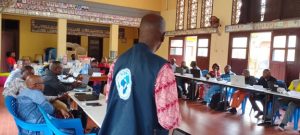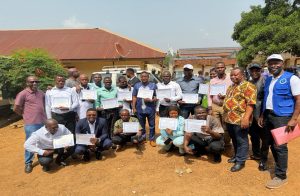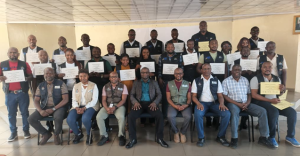AFENET provides logistic and technical support to the International STOP Program’s training events
-
by
AFENET
The African Field Epidemiology Network (AFENET) has since January 2017 successfully coordinated and provided logistic and technical support for the effective implementation of five International Stop Transmission of Polio (STOP) Program training events, with technical and financial support from the US CDC. The STOP Program is implemented through the Centers for Disease Control and Prevention (CDC) in collaboration with the World Health Organization (WHO) and the United Nations Children’s Fund (UNICEF). The Program’s main objective is to support the mission and vision of CDC’s Global Immunization Division (GID) of “preventing disease, disability, and death through immunization”. Volunteer international public health professionals are trained and deployed globally to support polio eradication efforts and strengthen immunization systems and surveillance of vaccine preventable diseases in the countries where they work. Prior to deployment, the volunteers are required to participate in a three weeks training covering current immunization research and immunization program priorities, to impart capacity-building skills and technical assistance abilities.
International STOP training events that AFENET has hosted (2017 – 2019)
| Training event | Training Dates | Number of Participants Trained | Countries from which trainees were drawn |
|---|---|---|---|
| STOP 49 | 9-27 January 2017 | 59 Participants (Field training-24; Data Training-7; Measles Training-7; Communication training-21) | Bangladesh, Burkina Faso, Cameroon, Chad, Cote d’Ivoire, DR.Congo, Ethiopia, Ghana, India, Madagascar, Pakistan, Sierra Leone, Somalia, The Gambia and Uganda |
| STOP 50 | 5-23 June 2017 | 53 participants (Field Training-45 and Data Management -8). | Burkina Faso, Cameroon, Canada, Central Africa Republic, Chad, Cote d’Ivoire, DR.Congo, Ethiopia, Ghana, Kenya, Mali, Myanwar, Niger, Sudan, The Gambia and Uganda |
| STOP 51 | 8-26 January 2018 | 59 participants (Field Training-36, Communication training-13, Data Management Training-10) | Benin, Burkina Faso, Burundi, Cameroon, Chad, DR. Congo, Ethiopia, Ghana, Kenya, Madagascar, Mauritania, Sierra Leonne and The Gambia. |
| STOP 52 | 4-22 June 2018 | 72 Participants (Field Training-52, Communication training-9, Data Management Training-11) | Bangladesh, Burkina Faso, Cameroon, Chad, Cote d’Ivoire, DR.Congo, Ethiopia, Ghana, Guinea, Kenya, Madagascar, Mali, Niger, Sudan and Uganda. |
| STOP 53 | May 6-17, 2019 | 123 Participants. (Field Training-82, Communication training-22, Data Management Training-19) | Burkina Faso, Cameroon, Canada, Central Africa Republic, Chad, Cote d’Ivoire, D R Congo, Egypt, Ethiopia, Ghana, India, Japan, Kenya, Madagascar, Nigeria, Pakistan, Sierra Leone, Somalia, Sudan, The Gambia, Togo and Uganda |
For 2017 to 2019, the international training events took place at the Commonwealth Speke Resort and Conference Center, in Munyonyo, Kampala, Uganda. AFENET provided support for the meetings under four components: logistics, travel, technical and administrative.
Logistic support: AFENET reserved hotel rooms and conference space for training participants. We also engaged interpreters, given the diverse origins of meeting participants. Other services included coordinating the acquisition of different materials from health facilities within Kampala Capital City required for the routine immunization (RI) case studies. Such materials included vaccine samples, cold chain equipment, vaccine carriers, ice packs, sample vials, immunization registers, child health cards, and child tally sheets.
AFENET also facilitated complex international travel arrangements for training participants, utilizing various modes of transportation as dictated by the needs of specific travelers and cost cost-effectiveness. We also provided visa support and troubleshooting of visa issues and managed excursions.
General administrative support was also provided, including but not limited to printing of training materials, scanning documents, ensuring internet access, disbursements of per diems, daily registration of attendees, management of emergencies and general information assistance for participants.
Finally, we prepared all accountabilities relating to the training events following approved templates.
Technical support: In collaboration with other global partners supporting the trainings, AFENET technical staff made presentations at the trainings; supported the facilitation of different case studies and sessions; reviewed presentations; and participated in session review meetings.
During the training, several side meetings were held between AFENET and CDC staff to obtain feedback and plan for subsequent STOP trainings, as a means of continuous quality improvement.
“Your team’s professionalism and customer service is second to none. We most certainly appreciate all of the support. We look forward to returning to Uganda in May of 2020 for STOP 54.” A. J. Williams, Public Health Advisor and Team Lead for STOP Program at CDC/DDPHSIS/CGH/GID/SIWD said, while commenting on the role of AFENET during STOP 53 training in May 2019.



